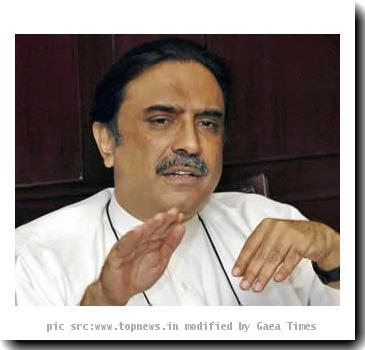‘Khyber-Pakhtoonkhwa?’ Pakistan moves closer to renaming region known for Taliban presence
By Riaz Khan, APWednesday, March 31, 2010
Pakistan moves closer to renaming volatile region
PESHAWAR, Pakistan — The rugged Pakistani province that was once a stomping ground for the British, and more recently gained a reputation as a Taliban and al-Qaida haven, may soon get a mouthful of a new name.
Feuding lawmakers on a committee reached a tentative deal Wednesday to rename North West Frontier Province “Khyber-Pakhtoonkhwa,” three members said. The agreement would remove a key obstacle to the approval of a constitutional reform package aimed at reducing the president’s powers and easing political tensions.
The debate that led to it also showed how much ethnic and cultural divisions still burden Pakistan’s 175 million people, fostering everything from separatist violence to demands for new provinces six decades after the country was formed under the banner of Islam.
Under tremendous pressure, the ruling Pakistan People’s Party has pushed the reform package, which would leave President Asif Ali Zardari, the party chief, largely a figurehead. Former military leader Pervez Musharraf had accumulated the powers when he was president.
Renaming the province was included in the package by the ruling party to get support from the Awami National Party, which leads the provincial government in the northwest.
ANP leaders wanted to call the province “Pakhtoonkhwa” to reflect the Pashtun (or Pakhtoon) ethnicity of three-fourths of its 20 million people. They argued the province’s current name does little more than help people find it on a map, while other Pakistani provinces — Sindh, Baluchistan, and Punjab — have names that match ethnic groups.
The main opposition party, the Pakistan Muslim League-N, said “Pakhtoonkhwa” marginalized other ethnic groups in the province. Some members also worried the name could stir grumbling in Afghanistan, which has a huge Pashtun community across the border.
The opposition party, whose primary strength comes from Punjab province, suggested non-ethnic labels such as “Abaseen” or “Khyber” in what is seen as an attempt for it to shore up its support among its non-Pashtun voter base in NWFP.
The compromise reached Wednesday is aimed at satisfying all parties involved, said three members of the constitutional reforms committee who requested anonymity because they were not authorized to announce the agreement.
The name is still subject to approval by Parliament. Khyber is also the name of a semiautonomous tribal region along the Afghan border that is home to the famed Khyber Pass, a major supply route for material heading to U.S. and NATO forces in Afghanistan.
In Peshawar, the main city in the northwest, residents generally reacted positively to the news.
“Now both are accommodated, but I think that those who wanted to rename it Khyber will call it Khyber, and those who wanted to rename it Pakhtoonkhwa will call it Pakhtoonkhwa,” said Wakeel Khan, a real estate dealer.
Ethnic nationalist sentiments are common in Pakistan, a country carved out of British India in 1947. Although Pakistan’s founding father Muhammad Ali Jinnah tried use the banner of Islam in calls for unity, divisions have long festered.
In Baluchistan, separatists have long fought for greater autonomy, or even independence, from a federal government they see as indifferent to their needs.
In southern Punjab, the minority Seraikis occasionally raise calls for their own province. And in NWFP, minority Hindko speakers living in Hazara division have at times also rumbled with demands for their own province.
“The fact is that after 62 years, we are not a nation,” said Pervez Hoodbhoy, a political commentator in Islamabad. “And although we could eventually become one, there’s been a lot of time lost and we have moved in fact into the other direction.”
Israr Khan, 33, a manual laborer in Peshawar, urged the politicians to remember that Pakistan has more pressing challenges than what to call a province.
“The price hikes, shortages of flour, sugar, electricity and lack of work are much bigger problems for me,” Khan said. “The name of the province is not of any use in my kitchen.”
Toosi reported from Islamabad. Associated Press Writer Zarar Khan also contributed to this report from Islamabad.

